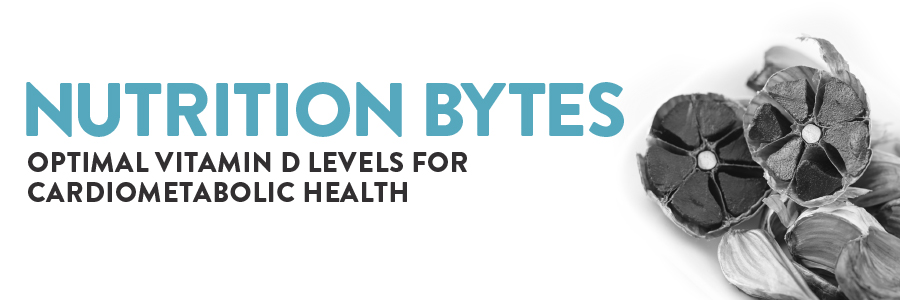


Sign-up for {N}power to get exclusive discounts, newsletters, members-only features, and more!
 Denver - Design District - Alameda and Broadway
Denver - Design District - Alameda and Broadway
368 S Broadway
Denver, CO 80209
United States
 Preferred Store:
Select a Store
Preferred Store:
Select a Store

The health benefits of vitamin D are well documented, but many Americans still have insufficient levels of this important nutrient. A new study published in the journal Nutrients shows that blood levels of vitamin D of at least 30 ng/mL are necessary for optimal cardiometabolic health.

Utilizing recent data from the National Health and Nutrition Examination Survey, researchers compared participants’ vitamin D levels to several markers of cardiometabolic health, including waist circumference, blood pressure, triglycerides, inflammation, and blood glucose and insulin levels, as well as incidences of metabolic syndrome and type-2 diabetes. The results showed that individuals with vitamin D levels over 30 ng/mL had significantly lower rates of metabolic syndrome and diabetes compared to those with lower vitamin D levels, and that the farther below 30 ng/mL the levels fell, the greater the risk of having cardiometabolic disease. Additionally, participants with D levels over 30 ng/ mL had smaller waist circumferences and decreased levels of inflammation, triglycerides, and insulin resistance, all markers of good cardiometabolic health. The researchers concluded that vitamin D blood levels above 30 ng/ mL are needed in order to have a beneficial impact on cardiometabolic health, including reducing the risk of metabolic syndrome and type-2 diabetes.
Vitamin D levels over 30 ng/mL are in line with the recommendations by the Endocrine Society to maximize the effects on calcium, bone, and muscle metabolism. According to the Endocrine Society, at least 1,500-2,000 IU of supplemental vitamin D may be required to achieve these levels for most adults.
A recent study published in Clinical Nutrition ESPEN found that supplementing with aged garlic extract (AGE) reduced obesity-associated chronic inflammation by modulating the immune system and improving immune function. In this double-blind, randomized controlled trial, 51 healthy adults with obesity were instructed to take 3.6g/day AGE (in two divided doses) or placebo for six weeks. Both before and after the sixweek intervention, researchers took blood samples to assess changes in the types of immune cells present, concentrations of inflammatory molecules, and blood lipid levels.
Results of the study revealed that compared to placebo, those supplementing with AGE had an increase in anti-inflammatory immune cells, in addition to a decrease in proinflammatory immune cells circulating in their blood. AGE consumption also greatly reduced the release of several inflammatory cytokines (signaling molecules used by the immune system), as well as LDL cholesterol. Such outcomes led researchers to conclude that by modulating the distribution of certain immune cells and decreasing inflammatory mediators, AGE has an anti-inflammatory effect in those with obesity.

This study has promising implications, as obesity leads to chronic inflammation (adipose cells are metabolically active and promote inflammation), which increases the risk for chronic disease, including cardiovascular disease and diabetes, and contributes to greater susceptibility to illness. By improving immune function, and thus, modulating inflammation, AGE supplementation may lead to fewer complications and comorbidities in those with obesity.



Sign-up for {N}power to get exclusive discounts, newsletters, members-only features, and more!
